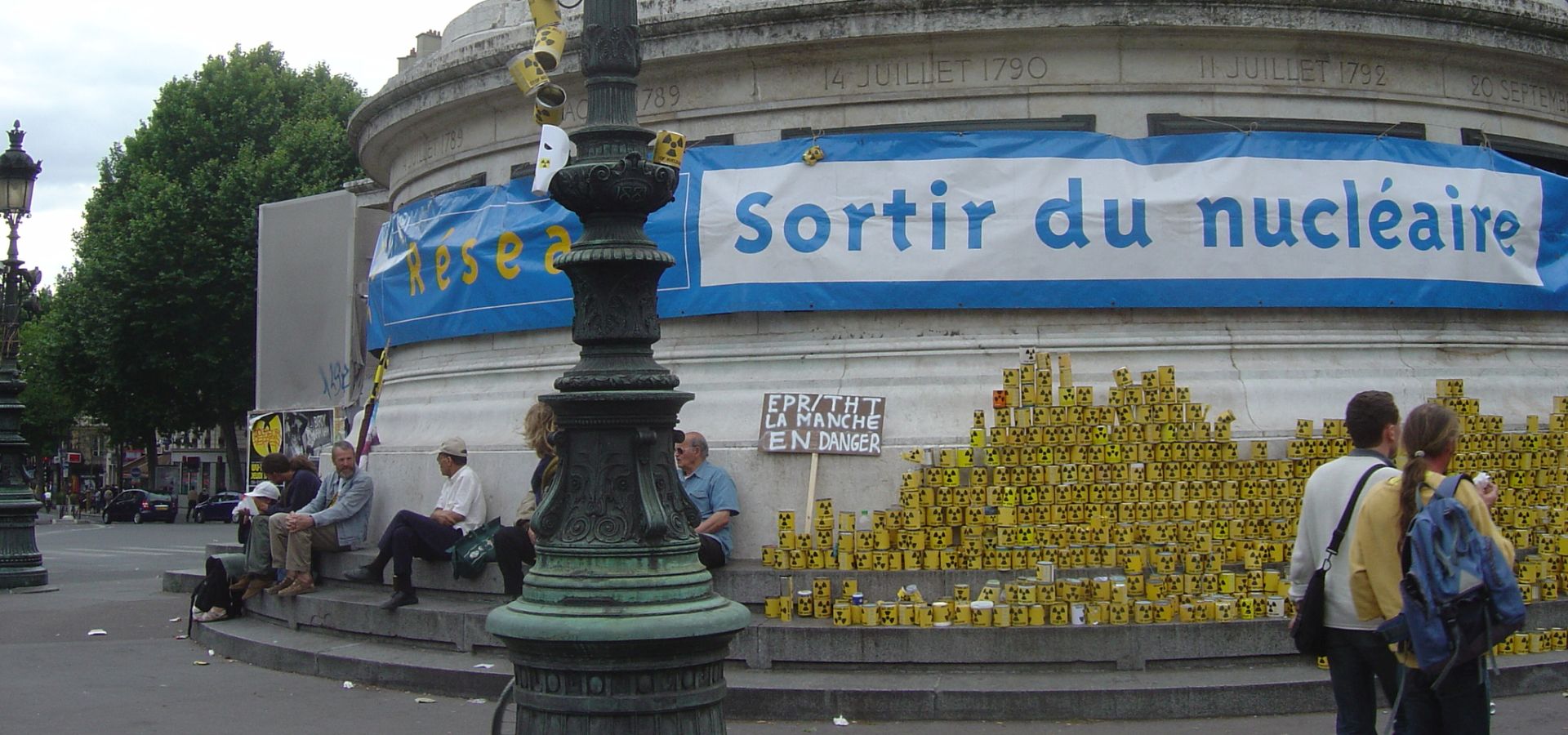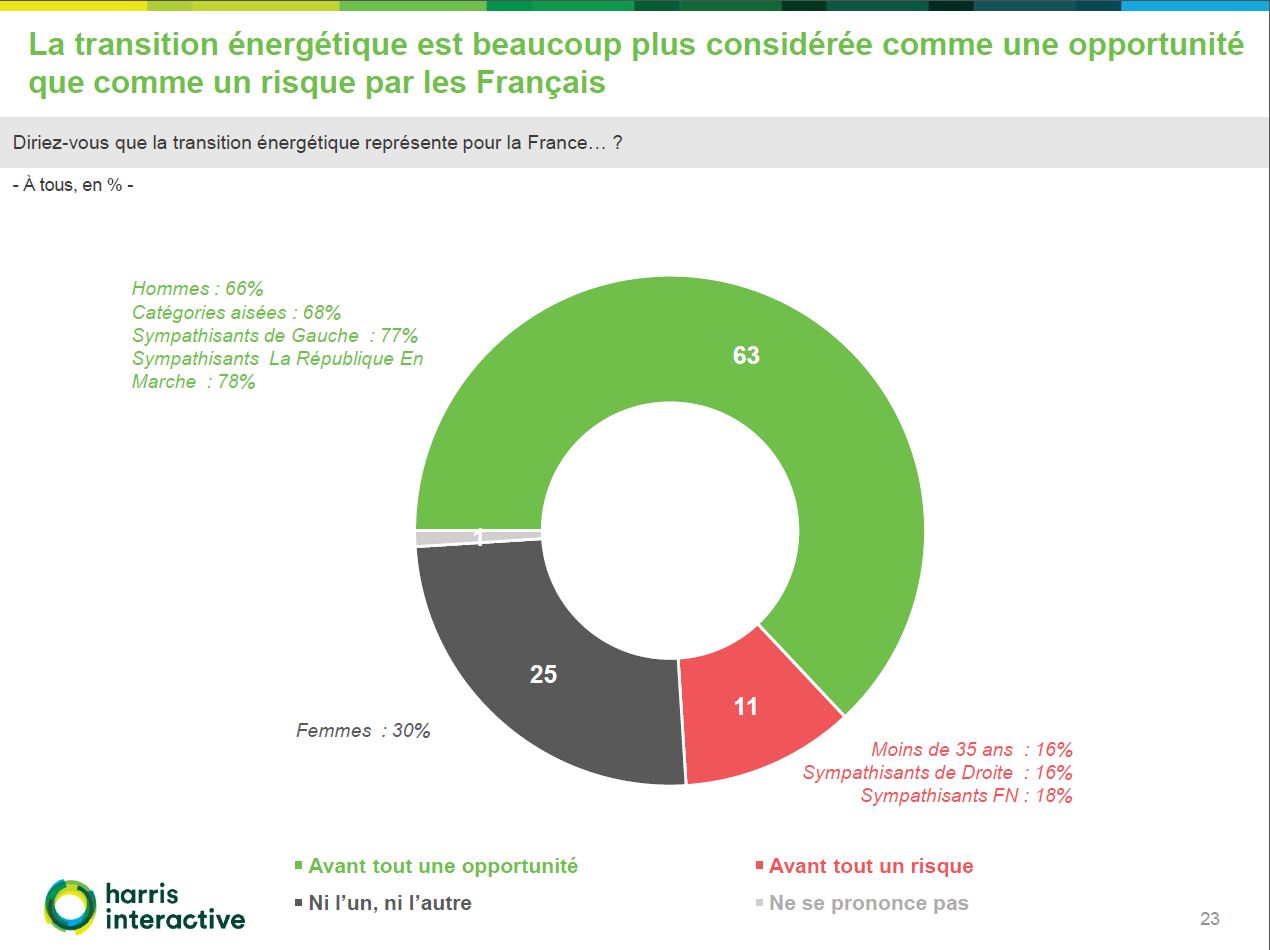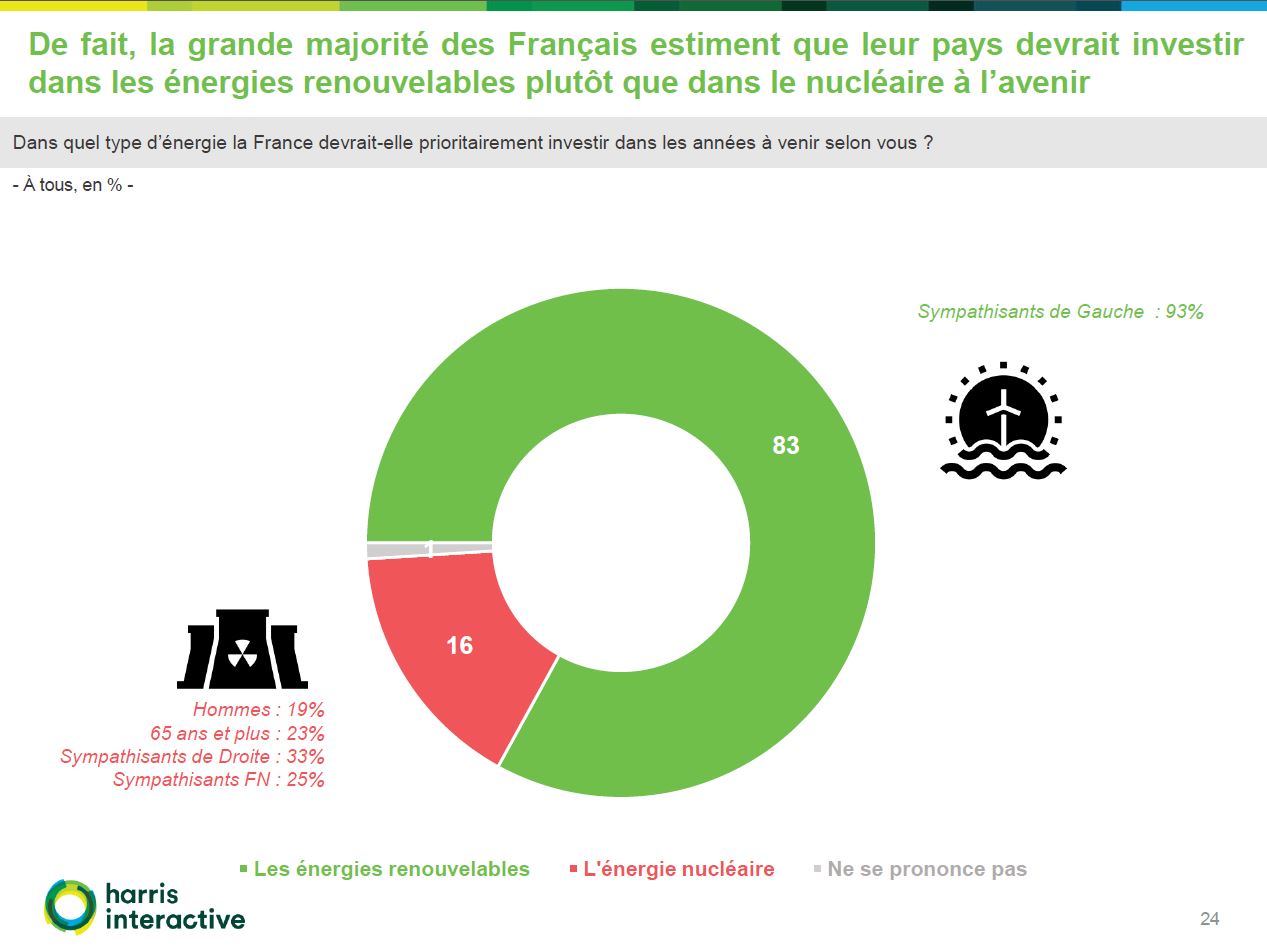In November 2017, French Minister Nicolas Hulot announced that the government target of increasing renewable energy in the electricity mix would be postponed. But do French citizens approve? Jules Hebert explains new findings that show high support for renewable energy and a positive view of the Energiewende.

France has postponed its energy transition – but for how long? (CC BY-SA 2.0)
Hulot’s announcement came as a surprise. He explained that the target of increasing the quota of renewable energy in the electricity mix “will be difficult to maintain”, and that the French government will propose a clear program to reach their postponed targets within a year.
The plan to reduce the share of nuclear energy in the electricity mix from 75 to 50 % was set out in the energy transition law, which was passed by the previous government in 2015. However, it is still lacking a concrete plan, as well as specific steps toward a new energy model – a bit like launching a boat into the water, setting out a course, but forgetting to hoist the sail and pull up the anchor. France is at a crossroads: the government could now choose to invest a lot of public money in a renewed nuclear model. Or it could choose to invest massively in renewable energies.
Energy transition as a major opportunity
It is often said that the French people strongly support nuclear energy as a jewel of the French industry. However, a survey commissioned by the French office of the Heinrich Boell Foundation and the French Think tank La Fabrique écologique, carried out by the research institute Harris Interactive, shows that the French people would rather like to pull up the anchor and set sail for a new model based on renewable energy.
Indeed, 91 % of interviewees consider the energy transition as “priority issue” (47%) or a “major issue” (44%). 63% see the energy transition as an opportunity rather than as a threat (11 %). But what should energy transition look like, according to them?

A clear preference for the development of renewable energy
The trend is very clear: 83 % of French people think France should prioritize investments in renewable energy. Only 12% of the interviewees prefer that investments go towards the modernization and life extension of nuclear power plants. 66 % of respondents come out against the construction of new nuclear power plants. It shows that the advertising and constantly repeated arguments that nuclear energy – often described as “clean energy” – is the only adequate solution when it comes to fighting climate change is not having the intended effect on French public opinion.

Also surprising is the fact that the actor in which the French people have the most confidence to lead the energy transition is neither the state (trusted by 49% of the interviewees) nor the energy producers and providers like the state owned EDF (trusted by only 46%). Rather, people trust citizen energy cooperatives (trusted by 78%), as well as NGOs and associations (trusted by 66 %).
A positive view of the Energiewende
Another salient point of the survey is the opinion of the French people about the German energy transition. Respondents perceived the German Energiewende much more positively than their economic and political elites: indeed, in the French public debate the German energy transition is often described as a “return to coal” or a financial abyss. The results of the survey by Harris Interactive show that although 72% of the interviewees judge that “the German energy transition has not contributed enough to the reduction of CO2 emissions” (which is true), 65 % of them also think that it has contributed to the creation of jobs and to a more dynamic economy. Over half of them see the Energiewende as “a good example for the energy transition.” Last but not least, the French people think France should work more closely with Europe (54%) and with Germany (51%) on energy issues.
The winds of change
In November 2017, the French government launched a working group on wind power, with the aim of facilitating the building of wind turbines and making them more profitable to municipalities. Furthermore, the state-owned energy company EDF (whose market share in France is around 85%) seems to have understood that nuclear energy could not be the only path for the future. The company announced a new plan for solar energy on December 11th, only one day before the One Planet Summit organized in Paris (two years after the Paris Agreement). 25 billion Euros will be invested between 2020 and 2035 to develop 30GW of solar plants in France – four times greater than its current capacity.
The next months will show if French President Macron and his Environment Minister Hulot are heading towards a new energy model, based on renewable and decentralized energy production, creating market value and jobs on a local level. This would align with Macron’s ambition to reduce inequalities between rural and urban areas, as well as to encourage small and growing innovative businesses.
The complete results of the survey (in French) are available here: Enquête “Le rapport des Francais à l’énergie” – Harris Interactive
In the press :
- FAZ: Die Franzosen wollen weniger Atomenergie
- Libération: Energie : les Français veulent plus de renouvelable et moins de nucléaire (französisch)
- Alternatives Economiques: Climat : la France est-elle vraiment exemplaire? (französisch)
Jules Hebert is program coordinator at the Heinrich Böll Foundation office in Paris. He works mainly on energy issues as well as on the transition to a more sustainable economy in France. He holds a Master in Environmental Policy from the Paris School of International Affairs – SciencesPo.
Because there is no significant pressure for accelerating the nuclear rundown, France has the luxury of time. Wind farms can be put up in two years onshore, and EDF is surely capable of doing this at scale, much more cheaply that Germany can from more favourable topography.. What I miss from Hulot is a storage strategy: pumped hydro schemes will take longer and have to navigate local opposition as well as construction problems. P2G does not enjoy the level of research support it is getting in Germany.
Furher to James comment, Hulot and Macron make no provisions for the peoples power by delegating responsibility for the transition energetique to EDF. Hermann Scheer rightly railed against such thinking in Germany. If it’s just EDF the transition will be slower than needed or otherwise not meet its objective3s.
[…] France is at a crossroads, writes Jules Hebert, program coordinator at the Heinrich Böll Foundation office in Paris. It can pursue a renewed nuclear model – or follow the German example and invest massively in renewable energy. It is often said that the French people support the nuclear path, notes Hebert – but a recent survey comes to a different conclusion. Article courtesy Energy Transition/Global Energiewende. […]
I just hope that people of france will have a rational discussion on this matter, backed up with facts not fantasy. They have a chance of actually do sth for the climate/world.
Not like germans who gave up to fearmongering and antinuclear, so that now it costs them 4000 deaths/year (air pollution), €-40B/year (environmental cost) and €-30B/year on energy transition which does not results in lowering co2 emissions and in the future, they will likely to stay depended on fossil fuels imports (mostly gas). Some say this a cost of democracy, but if your voters aren’t informed and are frightened into irrational decisions then it is really?
As a result of cleaner energy sector, france does not have many deaths related to pollution, it saves a lot of money on environmental costs and imports are lower. One of many pathways would be to expand nucelar and rather building renewables massively deploy subsidized EV vehicles/trucks to clean transportation sector. That will drive co2 into the ground. On grid clean like this, it actually makes sense to deploy EV vehicles. And as a pioneer of nuclear energy, building domestic plants will help them sell abroad, generating revenue. Heck that could even boost their auto-makers to go down the EV path.
http://environmentalprogress.org/big-news/2017/2/11/german-electricity-was-nearly-10-times-dirtier-than-frances-in-2016
https://i.imgur.com/DkdeDmx.jpg
https://i.imgur.com/UatdufN.jpg
https://www.umweltbundesamt.de/sites/default/files/medien/378/publikationen/hgp_umweltkosten_en.pdf
[…] France is at a crossroads, writes Jules Hebert, program coordinator on the Heinrich Böll Basis workplace in Paris. It might probably pursue a renewed nuclear mannequin – or comply with the German instance and make investments massively in renewable vitality. It’s typically mentioned that the French folks assist the nuclear path, notes Hebert – however a latest survey involves a special conclusion. Article courtesy Power Transition/World Energiewende. […]
[…] France is at a crossroads, writes Jules Hebert, program coordinator at the Heinrich Böll Foundation office in Paris. It can pursue a renewed nuclear model – or follow the German example and invest massively in renewable energy. It is often said that the French people support the nuclear path, notes Hebert – but a recent survey comes to a different conclusion. Article courtesy Energy Transition/Global Energiewende. […]